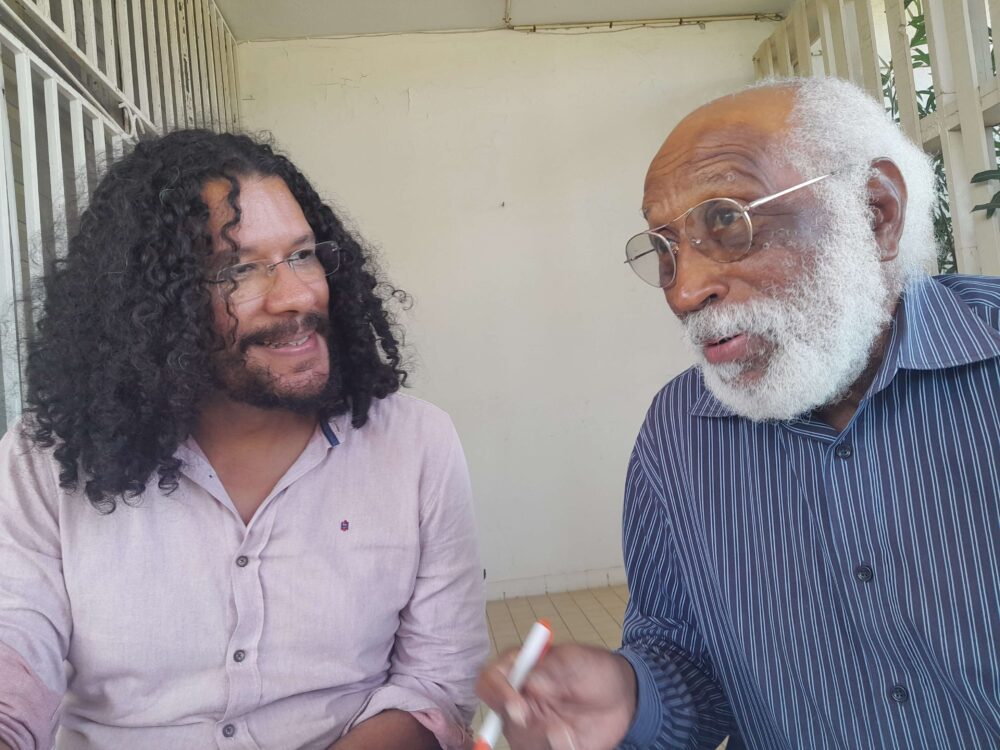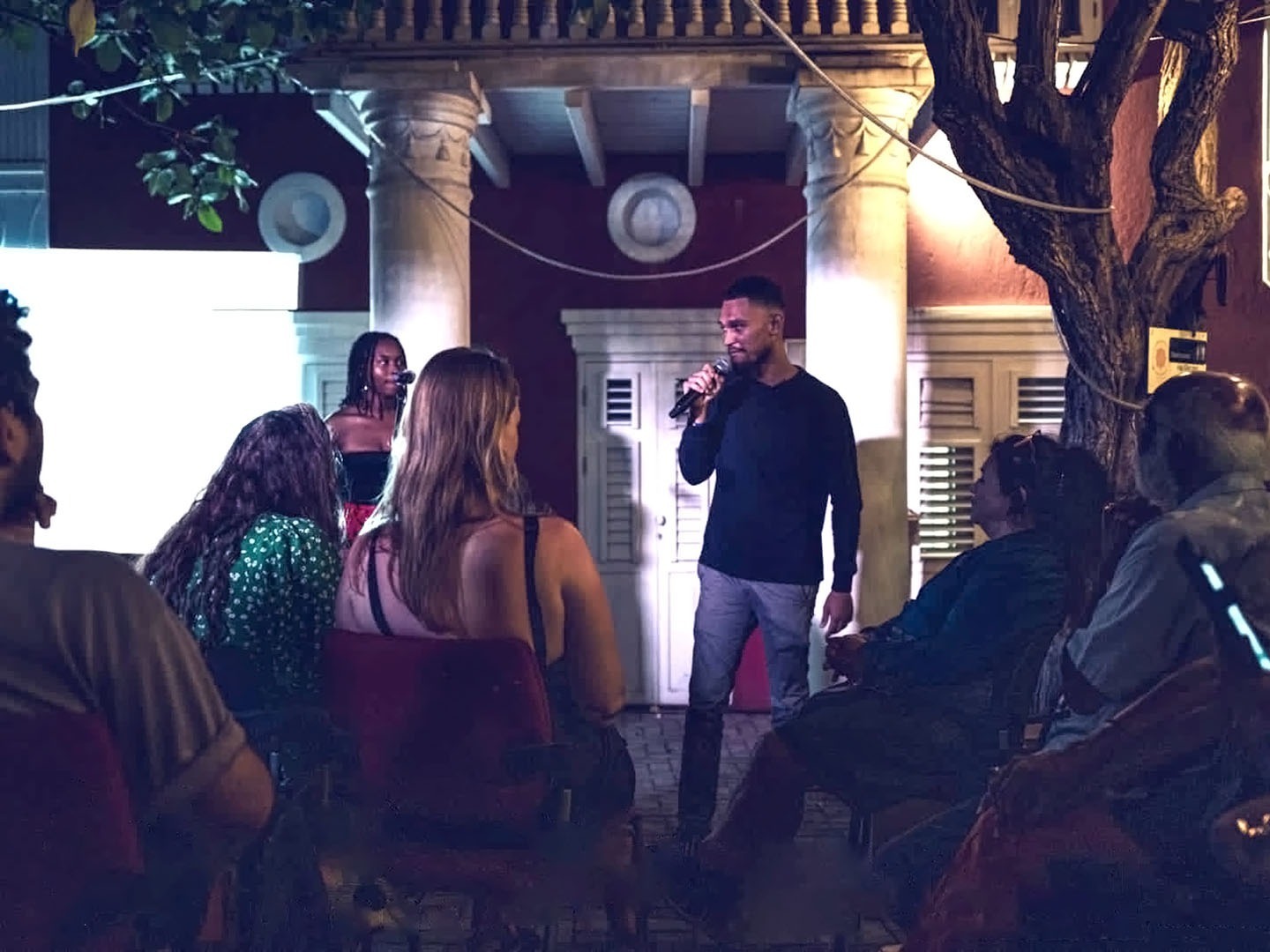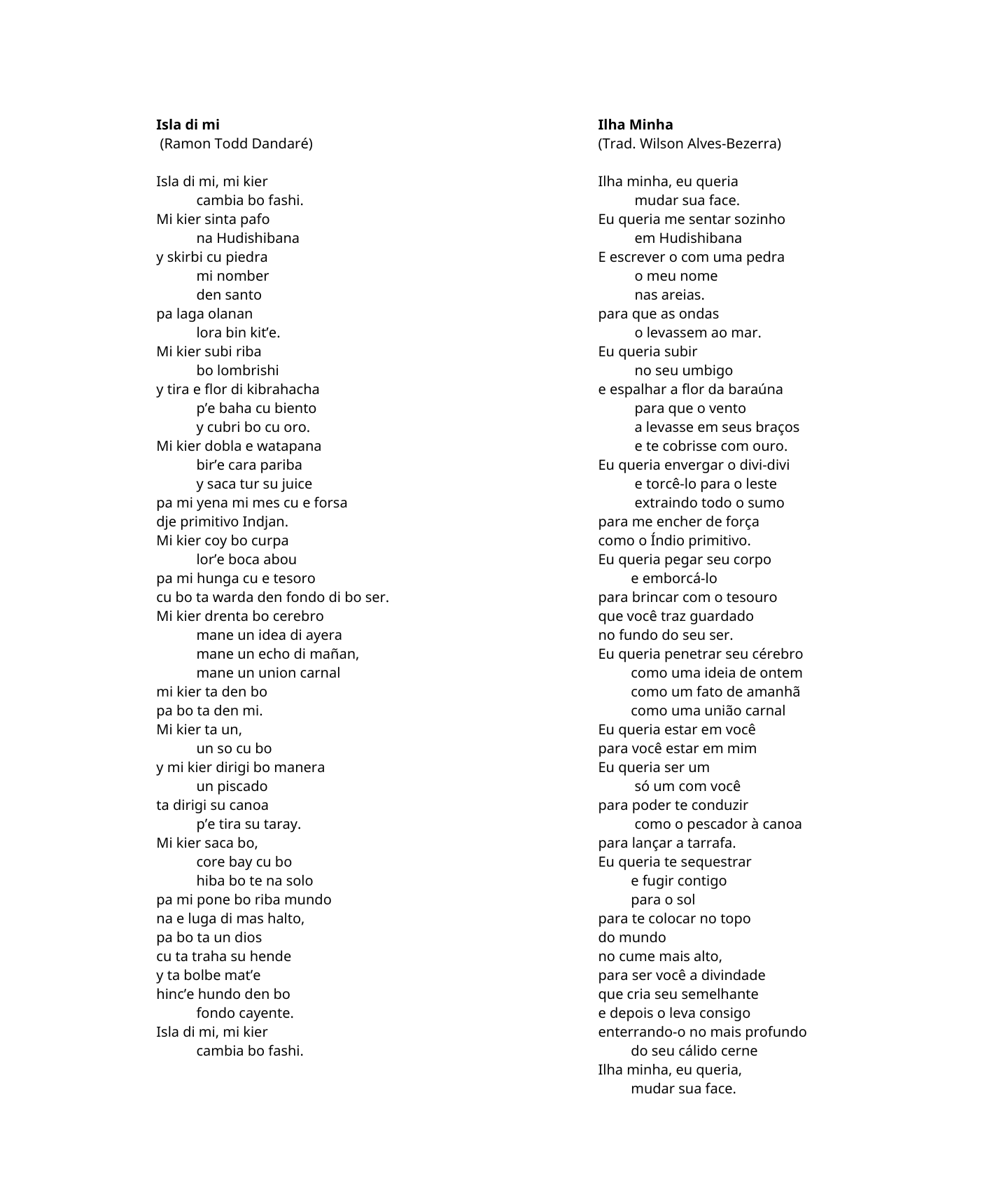From Language of the Slaves to Language of All: Papiamento in the Dutch Caribbean

Versión en castellano / Versão em português
On the Afro-Portuguese origins and future of a vibrant Creole. An interview with Ramon Todd Dandaré by Wilson Alves-Bezerra. English translating by Ian Barnett
Those who come to Aruba will be surprised at its multilingualism. This beautiful Caribbean island, initially inhabited by the Caquetio people, taken by the Spanish in 1499 and ultimately occupied by the Dutch in 1633, bears the marks of its history in the languages of its inhabitants: Dutch, Spanish – which was not restricted to the first century and a half of Hispanic presence but lives on through its proximity to the Venezuelan peninsula of Paraguaná – and above all, the local language, Papiamento.
Spoken by some 320,000 people worldwide, Papiamento is one of the official languages of Aruba and the neighbouring islands of Curaçao and Bonaire, and the mother tongue or heritage language of the islanders of the diaspora, scattered across the globe. There are different theories about the origins of Papiamento, but there is general agreement that this Creole’s name comes from the onomatopoeic word papear, meaning, in Spanish, ‘to speak in a confused manner’ or ‘mumble’ and, in Portuguese, to ‘chat’, ‘chatter’ or even ‘gargle’. The word furnishes an important insight into the origin of the language.
Ramon Todd Dandaré is one of the most renowned researchers on Papiamento. I met him at the first International Poetry Encounter, organised by the poet Arturo Desimone with the support of the Basha Foundation, Prins Bernhard Cultuurfonds Caribisch Gebied, the Looren Latin America programme and others. The meeting brought together poets, translators and the community in museums, educational institutions and public spaces in Aruba. In tandem with the Fundacion Lanta Papiamento (FLP), ‘Don Ramon’ acted as literary translator, rendering the work of some of the participating poets in the local language. So, I made the most of the opportunity to interview him.

In your article ‘Emancipation of the Papiamentu Language’, you suggest that Papiamento went from being the language of slaves to the language of all. Could you explain your theory?
According to my theory, Papiamento started out life as an Afro-Portuguese lingua franca on the west coast of Africa. From there, via Cape Verde, it reached Curaçao, where it continued to develop. It then spread to Aruba and Bonaire – in the eighteenth century – and went on evolving on all three islands, undergoing the influences of all ethno-social groups right up to the present day. In the seventeenth century, the population of Curaçao was made up of four ethno-social groups: 1) the Dutch Protestant upper class; 2) the (Sephardic) Jewish-Portuguese upper class, which arrived on Curaçao in the 1650s; 3) the indigenous Caquetio population; and 4) African slaves, under the domination of the two upper-class groups and in contact with them and the Caquetio. For practical reasons, the Dutch and the Jews were forced to use the ‘slave language’, as they termed it, as a lingua franca to communicate. The upshot was that the upper classes did not impose their language on the lower classes, and Papiamento rapidly became the language of all social classes.
Contrary to the normal run of things.
Exactly. Three phenomena caused Papiamento to evolve in a way unlike any other Creole: 1) the colonisers adopting the language of the slaves; 2) the slaves being educated in their native language Papiamento by the Catholic Church; and 3) the children of the ruling classes being raised almost exclusively by Papiamento-speaking nannies. Papiamento thus became the general high-status language.
At the end of last year, you gave your last lecture and declared that you were going to devote yourself exclusively to literary translation into Papiamento. Why do you believe it is essential to translate into Papiamento?
Because Papiamento is a relatively young language, in existence for barely 350 years. In other words, when Papiamento was a new-born, Cervantes’s Don Quixote and the plays of William Shakespeare were already on the scene. There are three documents that seem – to date – to be the oldest written documents in Papiamento: the fragment of a letter from a Jewish man in Curaçao to his lover in 1775, a 1783 letter from a Dutch lady to her Dutch husband, and a document signed by twenty-six forest rangers in Aruba in 1803. The first example of a literary work written in Papiamento, however, dates only from 1905, in Curaçao: the poem ‘Atardi’ by Joseph Sickman Corsen. And, while literature in Papiamento has continued to be produced ever since – though not in sufficient quantities – and a fair number of literary works has been translated – especially world-renowned theatre plays – far more translation of world-class works in both poetry and prose is needed. So, I think it’s extremely important for us to translate into Papiamento recognised literary works from the respective canons of languages familiar to us, like Spanish, Dutch, English and so forth, and from lesser-known languages, such as African, Asian, other European languages and the like.
Can literary translation strengthen a language like Papiamento, which was only officially recognised in Aruba twenty years ago?
The activity of translation has had and continues to have a beneficial effect, broadening the scope of activities to which Papiamento could be applied. The status of the language improved as a large number of internationally known works were translated into Papiamento. As with almost any language, the development of the written form is a crucial step in the growth of the language itself. Papiamento speakers owe a debt of gratitude to the writers, poets, playwrights, musicians and others who have used the language in their work.
Much as Papiamento is an everyday language in Aruba – there are even television, radio and newspaper programmes in the language – there aren’t many bookshops, or publishing houses for that matter, catering for the local language. What do you make of this situation and how could local publishing houses be bolstered?
The situation is sad and alarming but understandable in part. Aruba is a small island, of just 115,000 inhabitants. Papiamento is at present the language of instruction in only three schools on the island, Dutch being the language of instruction in education almost across the board. In other words, there isn’t much demand for works in Papiamento, just as there isn’t much demand for works in other languages, because there isn’t much enthusiasm for reading generally: very little is read, specifically fiction or other works. In fact, there is a publishing house, Charuba, but it publishes very little, being run by volunteers, almost all of whom are now retired, and the torch has not really been handed on to new generations. It seems to me that both more original literary production in Papiamento and the translation of works by foreign authors could give the publishing industry a boost. And Papiamento should be introduced into education to encourage love of reading, which would lead to more and better management by bookshops where the production, publication, distribution and sale of literary works is concerned.
What influence does the specific linguistic situation of Aruba have on literary production? What kind of relationship do writers have with Papiamento?
Literary production in any country is fundamentally grounded in the vitality of its national language, not just the spoken but the written language. So, as long as Papiamento isn’t being used in the education system, it will be very difficult to produce a large number of written works in the language. It’s commendable that the vast majority of Aruban authors – not to mention authors from the other two islands – are producing their works in their native language, Papiamento, and not the language they learned at school, Dutch. It comes as quite a surprise that, despite the presence on the island of speakers of three European languages (13% Spanish, 8% English, 6% Dutch) and a high number of other languages, literary production generally takes place in Papiamento, with the exception of the odd work in English or Dutch and almost nothing in Spanish. It’s admirable that, despite a linguistic situation in which European languages prevail in education, government, justice, commerce and tourism, cultural artistic production – literature, music, theatre and so on – is in Papiamento.
Are literary works originally written in Papiamento translated into other languages?
Literary translation in our islands is generally from other languages into Papiamento; there have been very few translations of literary works from Papiamento into other languages, and those that there have been are mostly into Dutch. So much so that some authors have chosen to publish their works in two, three or even four languages all together in a single volume. Work is beginning with cultural bodies in the Netherlands on how translation projects between the two languages – from Dutch into Papiamento and vice versa – could be galvanised. Literary translation of world-renowned works other than theatre is only just beginning to see the light of day, although there have been several projects to translate works for children and young people, for example. Finally, it should be borne in mind that literary translation of world-renowned works has so far been undertaken mainly by isolated individuals. There are very few literary translators and almost no literary critics in Aruba.
Just over 300,000 people are estimated to speak Papiamento worldwide. What future do you see for the language in the coming decades?
In a 2003 document, ‘Language Vitality and Endangerment’, UNESCO set out nine factors to establish the vitality of a language. After carrying out research on Papiamento in 2010, we came to the conclusion that it was a language with a high level of vitality and not in danger of disappearance or extinction. There are, however, certain important factors to be taken into consideration where the future of the language is concerned. One of the most significant is the language’s lack of presence in the educational system. To ensure the existence of the language, it is vitally important that Papiamento should be introduced in education, at least basic education. Another factor is the current influence of the English language in our society, especially among young people. This could lead to changes in the Papiamento lexicon – and possibly its morphosyntax, too – to such an extent that it could come to resemble a relexified English Creole or undergo changes leading to the language’s de-Creolisation. On the other hand, if the generational transfer, communicative mass-media output and creation of artistic works in Papiamento are maintained, the language could remain relevant and vital for a long time to come.


Ramon Todd Dandaré (Riohacha, Colombia, 1942) is a linguist, poet and literary translator. He is co-author with Lawrence D. Carrington and Dennis R. Craig of Studies in Caribbean Language (Society for Caribbean Linguistics, 1983). He has translated into Papiamento such authors as Ariano Suassuna from Brazilian Portuguese, Henrik Ibsen from Norwegian and Sophocles from Ancient Greek: his Antigone retains the iambic verses of the Greek original. His biography, E caya di Monche [Monche Street] by Benjamin Barliza (Imageprinting Ltda.), was published in Colombia in 2018.
Wilson Alves-Bezerra (São Paulo, Brazil, 1977) is a poet, translator and professor of Spanish-American literature in Brazil.

